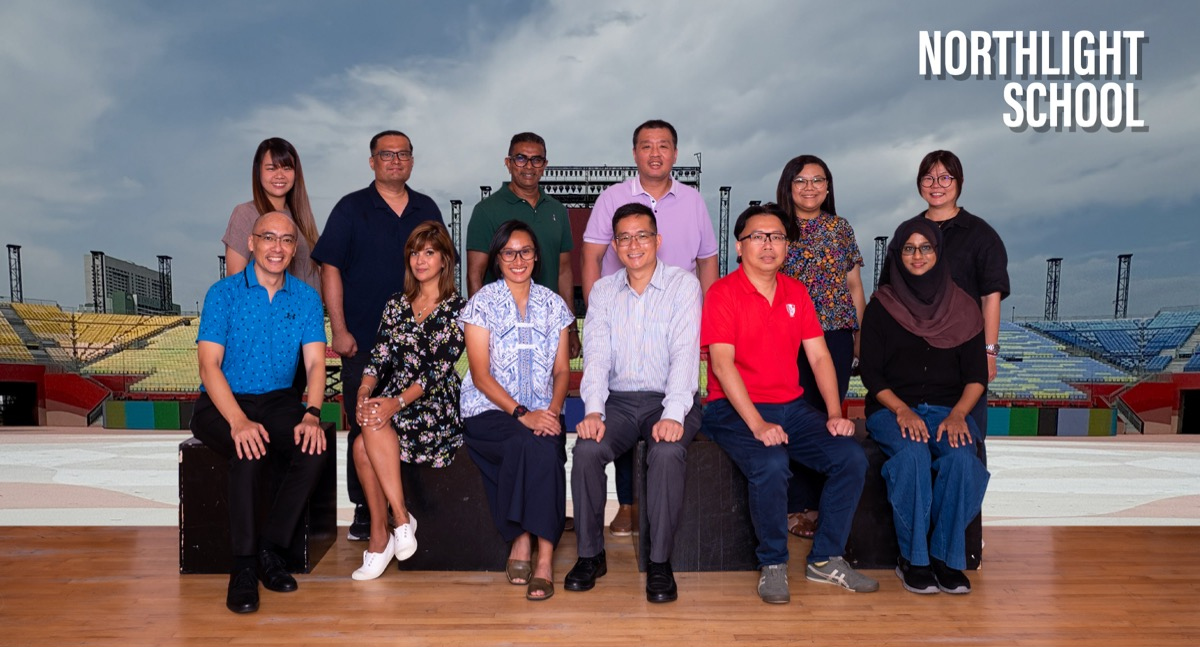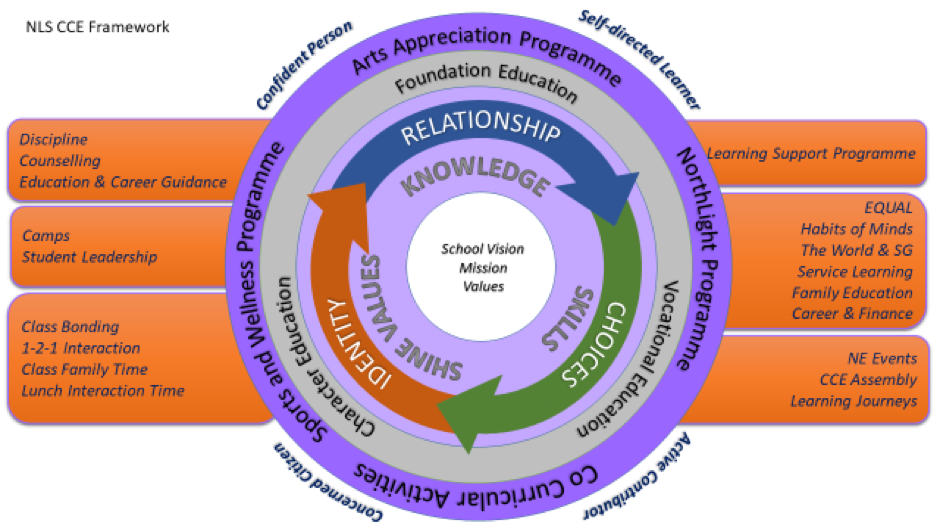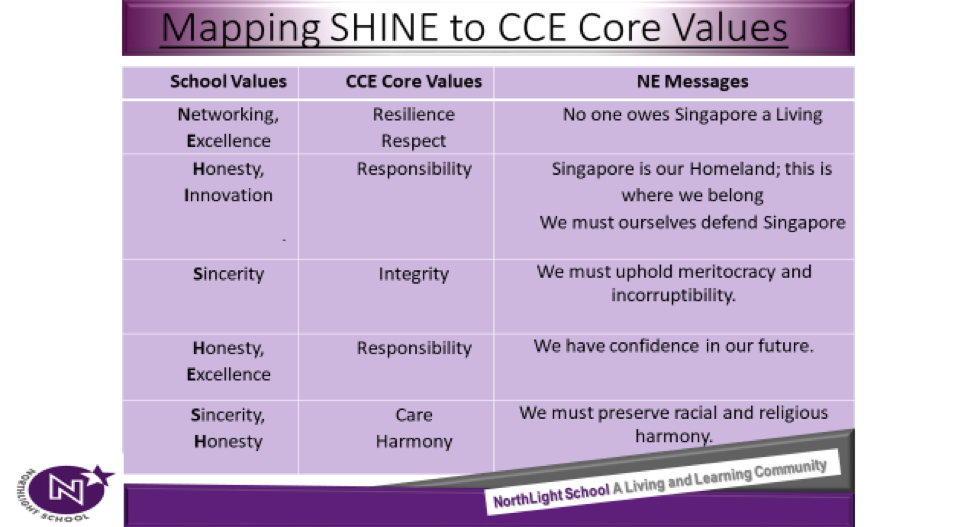Character and Citizenship Education
CHARACTER AND CITIZENSHIP EDUCATION

Character and Citizenship Education
Our Mission :
Nurturing students to be self-disciplined individuals that live out their values effectively. NLS aims to look into Character Development of NorthLight students which is centered on goals in the school’s Strategic Thrusts 1 & 2:
Strategic Thrust 1: Developing Character and Good Citizens
Strategic Thrust 2: Providing Career-Oriented and Skills-Focused education
The NorthLight School CCE Framework is anchored on the school motto “Never Give Up”. The school believes that in order for students to be resilient and confident global citizens, they need to have strength in character. This strength in character comes from within and every NLS student should learn to do his/her best and to embody the motto of “Do Your Best”.
CCE DEPARTMENT PROGRAMMES
-
Values-based Assembly
-
At-risk & Engagement Programmes
-
NorthLight Programme
-
NE Programmes
-
Values in Action (VIA)
-
Student Leadership
-
Reward & Recognition
WE AIM TO DEVELOP OUR STUDENTS TO BE
-
Confident persons with a mindset of excellence and integrity.
-
Active team players who can communicate effectively
-
Engaged learners with a passion for learning and a sense of responsibility
-
Concerned citizens who are caring and respectful
We are guided by the NLS CCE Framework which is based on the belief that education is about developing the child holistically. Centred on the NLS vision and mission, this framework focuses on the knowledge, skills and values which we hope to inculcate in our students to equip them to be citizens of good character and lifelong learners. Our student development efforts are guided by three big ideas – Identity, Relationship and Choices. The framework is supported by learning structures for instructional and non-instructional programmes. Eventually, we hope to nurture our students holistically so that we are able to achieve the eight CCE learning outcomes (LOs).
THE NORTHLIGHT SCHOOL CCE FRAMEWORK CAN BE ILLUSTRATED IN FIGURE 1.

**Figure 1: NorthLight School Character and Citizenship Education (CCE) Framework **
The NLS CCE framework is represented by a Swiss roll. In NLS, a sound CCE curriculum and framework forms the core of education for our students. Having good values, strength in character and citizenship serve as a moral compass to help our students to steer through life.
a) Core Values
Aligned to the Framework for 21CC and Student Outcomes, the SHINE values
(Sincerity, Honesty, Innovation, Networking and Excellence) in NLS form
the core of the NLS CCE Framework as core values are fundamental for a
NorthLight student to be a person of good character and to be a useful
citizen of Singapore who develops to be a lifelong learner.

Figure 2: Mapping of School values (SHINE) to the CCE core values and NE messages
b) 3 Big Ideas in CCE
To help NLS students develop key understandings of CCE, CCE has to be
anchored on the following 3 big ideas:
-
Identity - Having a sense of identity involves embracing a set of values and ideals. A well-developed identity gives on a sense of one’s strengths, weaknesses, and individual uniqueness (Marcia, 1966).
-
Relationships - Relationships engage children in the community to help them define who they are, what they can become, and how and why they are important to other people.
-
Choices - Choices are necessary to help students act upon values; to do what they believe is right, even in the face of pressure and temptation (Lickona, 1991). Thus, choices are platforms that enable students to apply and clarify their values.
c) Enhancing Teacher-Student Relationship (CFT & LIT)
To fulfil its vision to be a living and learning community, NLS will focus
on relationship building within the school community. Structures and processes
are in place to build a living and learning community. These will include
classes meeting their form teachers in the morning (CFT) and protected
meal times (LIT) within the school community. Other school-based activities
including level-wide school camps, sports day, inter-class competitions
will serve to nurture and further enhance teacher-student relationship.
d) NE Events and Programmes
The purpose of National Education is to develop national cohesion, the
instinct for survival and confidence in the future by:
-
Fostering a sense of identity, pride and self-respect in being Singaporeans;
-
Relating the Singapore story: how Singapore succeeded against odds to become a nation;
-
Understanding Singapore’s unique challenges, constraints and vulnerabilities, which make us different from other countries; and
-
Instilling the core values of our way of life and the will to prevail, all of which ensure our continued success and well-being
e) Post Exam Activities
-
One NE activity for each Post Exam period;
-
Arts Appreciation activity for each Post Exam period;
-
Class Bonding activities to enhance TSR
THE NORTHLIGHT PROGRAMME (NLP)
NLP is part of the school Character and Citizenship Education. It aims
to support the school mission to provide an engaging career-oriented and
values-focused education for youth and prepare them for lifelong learning
and employability.
There are 5 broad objectives:
-
Support students’ development as socially responsible citizens who contribute meaningfully to the community through the learning and application of values, in particular the school values of SHINE – Sincerity, Honesty, Innovation, Network and Excellence
-
Acquire socio-emotional competencies and Habits of Mind to help students learn skills and knowledge for meaningful relationships and to help them face various challenges in life
-
Acquire Habits of Mind – a disposition to behave intelligently when confronted with problems or uncertainties
-
Equip students with the necessary knowledge, skills and values to make informed decisions for successful transition from school to further education or work
-
Develop students to become concerned citizens by helping them to better understand the interconnectedness of Singapore and the world we live in
A brief outline for the curriculum is shown in the table below.
|
Domains |
NLP Components |
||
|---|---|---|---|
|
Year 1 |
Year 2 |
Year 3 |
|
|
|
Service Learning
|
Service Learning
|
Service Learning
|
|
Socio-emotional Competencies |
Social Skills
|
Social Skills
|
Social Skills
|
|
Habits of Mind |
EQUAL
|
EQUAL (Y2 Junior)
|
|
|
Education & Career Guidance |
Career & Finance |
Career & Finance |
|
|
National Education |
The World & SG |
The World & SG |
|
NLP ASSESSMENT IS BASED ON THE FOLLOWING MODES:
-
Project work
-
Performance tasks
-
Observation
STUDENT WELL-BEING
Various support programmes are in place to provide provision of care for our students. These support programmes ensure their socio-emotional well-being and development. They are supported by Year Heads, Discipline Masters, Teachers, Full Time School Counsellors, Educational Psychologists, School Welfare Officers, School Health Advisors and Pastoral Care Officers
(a) Counselling
Various personnel in the school will help to facilitate the personal growth,
development and self-understanding of every child in NLS. This in turn,
empowers the child to adopt more positive and constructive life practices.
Counselling can help our students to develop a clearer understanding of
their concerns and challenges and thus help them to acquire new skills
to better manage their personal as well as educational issues.
PARTNERSHIPS
NorthLight School strives to form strategic partnerships with our stakeholders, anchored on the various key approaches with the aim of developing the 21st century competencies in our students. The guiding principle is grounded on the belief that the home, school, industry and community have a shared goal to create an environment that best supports all NLS’ students learning and development. Parents have a primary influence on their children’s total development, while schools provide the foundations through formal education. Industry and community partnerships present authentic opportunities to build the students’ sense of identity and responsibility towards the community and nation. The home, school, industry and community must work together in mutual trust, respect and understanding to bring the best out of the students.

